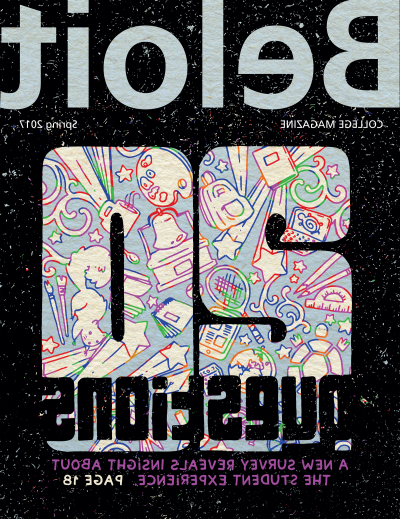Flipping the Classroom with Confucius
The erudite professor of anthropology and history can wax eloquently about everything from Émile Durkheim to baseball stadiums.
In short order, after arriving on campus in 1998, he became one of Beloit’s celebrated professors, taking home the Underkofler Excellence in Undergraduate Teaching Award in 2001, and again in 2011. He met his wife, Patricia Zody, while she directed Beloit’s Center for Language Studies. He headed up a team of Beloit professors who wrote an acclaimed textbook, Asia in Focus: China, in 2009.
Well-known among the student body for his lively in-class persona, LaFleur is always striving to find new, stimulating ways to bring his research interests—which primarily center around his anthropological fieldwork in China— into the classroom. In the past, he’s had students work with collaborators as far afield as Doylestown, Pa., in order to help the small town’s historical society. He’s used Led Zeppelin’s “Stairway To Heaven” to explain the perfect way to construct an essay. His latest method? “Flipping the classroom.”
The idea started when LaFleur was invited to record 24 lectures for the popular lifelong learning program Great Courses. The series, “Books that Matter: The Analects of Confucius,” focuses on a longtime research interest of LaFleur’s—influential Chinese philosopher Confucius and his famous book. For the lectures, LaFleur created his own translation of the Analects, completing about half of the text. He hopes to translate the entire text soon. But more importantly for LaFleur, Great Courses gave him a chance to experiment in his Beloit classroom.
By having students view the lectures outside of class, LaFleur opened up time for more thorough and in-depth class discussions. “The lecture series started from my research, and then I decided to teach the course in order to prepare for the lecture series. These lectures really exemplify, probably better than anything I’ve done before, the idea that teaching informs research and research informs teaching,” he says.
LaFleur’s work extends far beyond the confines of Beloit College. In the past two years alone, he’s found himself traveling to a staggering number of places: Germany, Sweden, Greece, France, and especially China. Within the populous East Asian nation, he has visited Shanghai, Beijing, Qufu, and a slew of other locales.
The Five Great Mountains of China, vastly important landmarks in Chinese history and traditional religion, are a frequent destination for LaFleur. He is working on a series of books about the mountains, and after spending more than 600 days there over the past decade, he has completed five manuscripts totaling more than 1,200 pages.
LaFleur makes it clear that having the opportunity to both research and teach his life’s greatest passions are a recipe for a tremendously fortunate life. “I’m just lucky,” he admits. “I’ve gotten to shape my life the way I want to lead it.”
A large part of that shaping has revolved around his dedication to finding the proper balance between scholarship and teaching. “I slow myself down. But if I didn’t care about teaching and didn’t care if my students learn, I could get a lot
more done,” he laughs.
Quoting a mentor from graduate school, LaFleur says, “Being a professor is like having homework for the rest of your life. Homework you want to do,” he adds quickly.
LaFleur’s list of pending projects seems daunting. He hopes to work with his wife to compile several journals from an “accidental ethnographer” named William Edgar Geil. He is translating both the Analects and a dense examination of Chinese thought from 1934 titled La Pensée Chinoise.
This list of projects is not intimidating to him, however. He simply reiterates his teaching mantra: “Teaching informs research, research informs teaching.” To LaFleur, the opportunity to pursue this philosophy has been a unique privilege afforded to him by Beloit, a privilege he hopes to continually translate into academic progress.
“It is all a continuous circle, and you have to have both ends,” LaFleur says. “That’s what’s so special about Beloit College. It really is a beautiful thing.”
10 Things to Know
Professor Rob LaFleur and his class collaborated on this list of things they think you should know about Confucius and the Analects.
- Westerners find Confucius’ Analects very difficult to read (and so, too, do Chinese readers).
- This difficulty arises because the book seems at first to be a hodge-podge of aphorisms. A colleague once told Professor LaFleur, “It’s as though 500 fortune cookies fell from the sky, and people just stuffed them arbitrarily into 20 chapters.”
- You don’t have to read Confucius’ Analects from start to finish, but it might be easier to read if you go straight through (rather than skip around).
- Confucius had almost no influence on the world of his own day, but his influence grew by the century. Now, he is seen as one of the great figures of world history.
- Confucius did not write a single word of the Analects. Although many passages begin with “The Master said…”, the text that people have read for 2,500 years was compiled by his students (and students of students).
- People don’t “believe” in Confucianism in the manner that people “believe” in theistic religions. Instead, Confucianism is what people do—act with integrity, give offerings to their ancestors, and know their responsibilities in society.
- Confucius’ teachings are about doing things, managing oneself, and getting good at life.
- There are many English translations available. Get to know several of them.
- Confucius’ Analects influenced governmental thinking in China for many centuries, since people had to study and memorize the text to pass the imperial examinations—the key to advancement in traditional Chinese society.
- Reading the Analects and really thinking about how the teachings connect to your own life can help to make the life you lead richer and more reflective.




